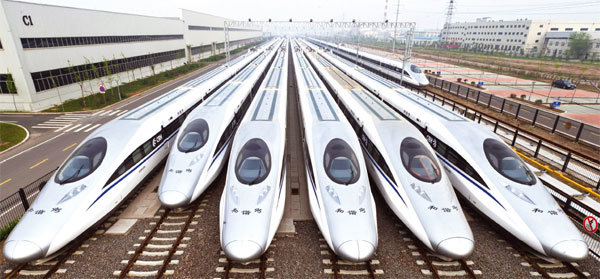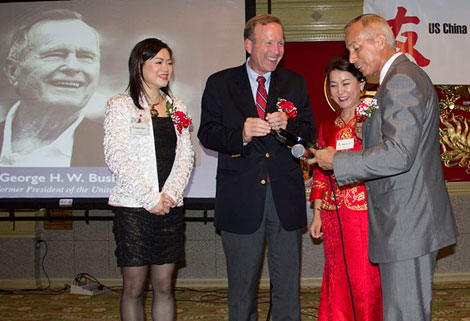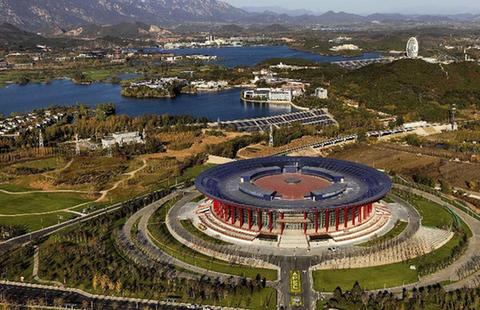Key economic reforms in spotlight
Updated: 2014-11-11 08:20
(China Daily)
|
|||||||||
Editor's Note: President Xi Jinping said at the APEC CEO Summit 2014 opening ceremony on Sunday that comprehensively deepening reform will not only liberate productive forces but also unleash the vitality of society. Following are some major economic reforms introduced since the Third Plenum of the 18th Central Committee of the Communist Party of China held in November 2013, which are expected to continue playing a significant role in China's economic and social development:
China's financial market system will be improved, according to the communique of the Third Plenum.
Guo Jianguang, a professor at the Central University of Finance and Economics, said the market, rather than the government, is likely to play a more important role in deciding China's exchange and interest rates. As an effective measure to control the macroeconomy, the exchange and interest rates have long been tightly regulated, he said.
China started to allow banks to decide their own lending rates in July, although deposit rates are still fixed by the central bank. The limit on the deposit interest rate should be lifted to benefit the public, Guo said. A deposit insurance system should be established as soon as possible to prevent banks from malicious competition, he added.

EXCHANGE, INTEREST RATES
The yuan has appreciated more than 35 percent against the US dollar since 2005 as China has begun building a market-oriented exchange rate mechanism. The People's Bank of China, the central bank, increased the floating range of interbank yuan-dollar spot transactions from 1 percent to 2 percent in mid-March. The China (Shanghai) Pilot Free Trade Zone, created last year, is to promote the convertibility of the yuan's current account. More countries have made the yuan a reserve currency, and booming offshore yuan markets in Asia and Europe reflect the international community's demand for internationalization of the yuan.
Support will be given to ensure the healthy development of the nonpublic economy, the communique said.
Mei Xingbao, an external supervisor for the Bank of China, said a multi-layered capital market is likely to be cultivated with more private capital.
Competition will be introduced to improve the efficiency of State-owned banks, which have already accumulated large amounts of wealth through financing government-funded projects, he said.
He said it is expected to become easier for small and medium-sized enterprises to get loans from banking agencies after competition is introduced.
State-owned banks tend to resist reform because they have got used to earning money easily through government-funded projects, Mei added.

COMPETITIVE BANKING
Chinese banks will face unprecedented competition once interest on deposits is no longer controlled and more investors are allowed to run and establish banks. Banks will be allowed to fail. The government has made efforts in five key aspects to deepen financial reforms. First, it welcomes more investors in the sector. The central authorities approved the establishment of five private banks this year. And a banking regulatory department delegates and cancels many powers. Foreign capital has been allowed since October. Also, private investors have more opportunities to invest in insurance companies, and the government has strengthened its supervision of the shadow banking system.
Much has come from the third plenum regarding the management of State-owned assets, particularly State-owned enterprises. The reforms are not going to wipe SOEs out of existence, however.
The communique said China's basic economic system is one that depends on public ownership as its main body but allows for the prosperity of various ownerships. Both public and nonpublic ownerships are important components, it said.
Regarding public ownership, represented mainly by SOEs, it said China will continue to strengthen their vigor, their power of self-control, and their influence. For nonpublic sector ownership, such as the millions of privately held small enterprises, the communique said China will provide ample room for their vitality and creativity.
In the meantime, it said, due protection will be cover property rights, to develop a mixed economy (a mix of public and private ownership), to push for a modern enterprise system in SOEs, and to support the healthy development of nonpublic enterprises.

MIXED OWNERSHIP REFORM
China is welcoming private investors to participate in a State-owned enterprise stockholding reform. The State Council is expected to issue a list of SOEs early next year for this key reform, which has already begun for many SOEs in most of China's provincial-level areas. By the end of October, more than 20 such areas had unveiled their opinions - which amount to de facto action plans - on the knotty reforms, which may serve as a reference for the central authorities. The total property value of the central and local SOEs amounts to about $16.33 trillion. The purpose of the reform is to improve the performance of SOEs in market performance and service to the public.
The third plenum communique did not mention the word monopoly once. However, one of the most frequently mentioned words was "market". It featured 22 times.
"Building a unified but open, orderly and competitive market system will guarantee the market plays a decisive role in the allocation of resources" in society, it said.
On this basis, autonomous management and fair competition can be made possible as well as consumers' free choice and the free flow of goods and services. A major effort is to be made toward this goal, and to knock down the internal barriers holding back progress in efficiency and fairness.
The leadership also called for the further liberation of people's minds and society's productivity by removing defects in all aspects of the system.
The process will be quickened in economic structural reform, to build a more efficient, equitable and more sustainable economy, the communique said.

MARKET ROLE DECISIVE
The State Council has canceled or delegated 637 approval rights in seven batches since last year to stimulate the vitality and innovation of all kinds of market players. Government data show that about 10,300 private businesses have been registered daily in the past eight months as governments at various levels have cut red tape. The number of newly registered businesses amounted to nearly 8.64 million since March (up 15.2 percent year-on-year), with registered capital of $2.31 trillion (up 80.72 percent year-on-year). The government will also remove many controls on the prices of some commodities and services to let the market play a decisive role in allocating resources.
China must accelerate construction of a new agricultural management system and give farmers more proprietary rights, to realize the equal exchange of production factors, achieve a fair allocation of public resources between urban and rural areas, and promote healthy urbanization, the communique said.
Granting farmers overdue property rights of collective land is a breakthrough, said Pan Jiahua, a researcher on urbanization with the Chinese Academy of Social Sciences, who explained that a land-transfer market becomes conceivable once farmers' proprietary rights are confirmed.
This milestone will bring concrete benefits to farmers, lay a foundation for modern agriculture, and pressure local governments to end their reliance on land transfers for large profits, he said.
Li Tie, a researcher on city development with the National Development and Reform Commission, said: "Only by removing institutional restrictions hindering the free flow of economic factors can the potential of healthy urbanization really be released."

LAND REFORM
The land issue is central to the Chinese economy, and the reform of land transactions is expected to help solve many thorny problems of the national economy. The central government issued a guideline on land reform in October, allowing farmers to transfer land management rights to promote a modern agricultural industry on a larger scale. Land is collectively owned by farmers in a village in China. The reform requires authorities across the country to amend land laws so that farmers get legal rights and channels for transferring the management rights of the land they contracted from the villages. Villages will become a dynamic market and industrial base for various investors after the land reforms are in place.
A scientific fiscal and taxation system is an institutional guarantee to optimize resource allocation, protect the integrity of the market, safeguard social fairness and maintain China's long-term peace and stability, the communique said.
"Although there are few details, this part should contain simplification of tax items and a new tax base for local governments," according to Rui Meng, a professor of finance and accounting at the China Europe International Business School. "Local governments should no longer rely on increment (land transfers) and should shift toward inventory (property tax)."
Minister of Finance Lou Jiwei has previously promised to expand trials of a property tax, while reform of the consumption tax is also in sight. The resource tax on coal and metals, which had been levied by volume, will be calculated on a price basis, he said.
"These three aspects should be part of the tax reform," Rui added.

TAX REFORM
The State Council decided late last year to include railway transportation and postal services in tax reforms. They will pay the value-added tax, rather than the business tax, to relieve tax burdens on those industries. The switch has picked up speed since December. The government will increase taxes on natural resources to protect the environment and conserve resources, and it will adjust consumption taxes to boost demand and consumption at home. Since August 2013, the government has exempted small and micro-sized businesses from the value-added tax and business tax. The exemption benefits more than 6 million enterprises whose monthly sales are less than $3,300 and creates tens of millions of new jobs.
The communique said: "we must attach importance to legislation, explicitly clarify the duties of governments at various levels ..."
Rui Meng, a professor of finance and accounting at the China Europe International Business School, said he believes the central government will withdraw some expenditure duties.
"Previous statements only stressed local government 'initiatives', but this reform is aimed at the long-discussed disparity between local government revenue and spending responsibilities," he said.
"This is a call for curbing reckless borrowing," he continued. "Too often, local governments have invested heavily in redundant projects with very low returns. They should leave most investments - infrastructure, for example - to the market, thus reducing low efficiency and rent-seeking in these activities."
Curbing reckless borrowing also requires a transparent budget system, he said.

CENTRAL VS LOCAL DUTIES
The central government will provide for basic public services and national needs, such as national defense, security and food safety. The local governments will take care of the diverse needs of local residents with their own budgets. The State Council issued a guideline on strengthening supervision of local government debt last month. The guideline, which specifies the legal channels through which governments can raise funds, the scale of their funding and how to prevent and handle debt risks, lays out a complete institutional framework to improve the administration of local government debts.

(China Daily USA 11/11/2014 page9)
- Li's Myanmar tour to open new chapter in China-ASEAN ties
- Li suggests greater China-Chile trade cooperation
- President Xi lends support for HK
- China plans to launch about 120 applied satellites
- Tiny apartment near desirable school fetches huge price
- Xi calls for mutual trust, respect across Taiwan Straits

 Peaking for APEC
Peaking for APEC
 Scenery near Yanqi Lake in Beijing
Scenery near Yanqi Lake in Beijing
 Germany celebrates 25th anniversary of fall of Berlin Wall
Germany celebrates 25th anniversary of fall of Berlin Wall
 Obama arrives in Beijing for APEC meeting, state visit
Obama arrives in Beijing for APEC meeting, state visit
 'Friendship mode' key in China relations
'Friendship mode' key in China relations
 Herdsmen of Tajik ethnic group play traditional game
Herdsmen of Tajik ethnic group play traditional game
 Singles' Day sales that reveals a lot
Singles' Day sales that reveals a lot
 Scenery of APEC venue Yanqi Lake in Huairou District
Scenery of APEC venue Yanqi Lake in Huairou District
Most Viewed
Editor's Picks

|

|

|

|

|

|
Today's Top News
President hails regional trade move
New '11.11' sales record for Alibaba
New visa extension will boost Chinese tourism to US
Tencent attracted by romance of travel into space
Rick Snyder seeks to woo China trade and giant pandas
Shanghai-HK stock connect starts on Nov 17
Master chef dishes up secrets of Western cuisine
Alibaba’s '11/11' opening sales break record
US Weekly

|

|








